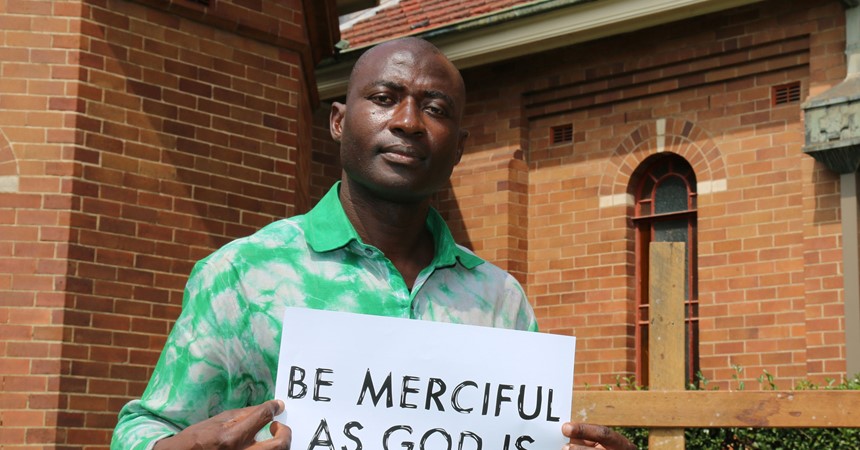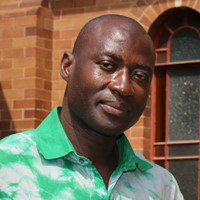It took six years in the refugee camp in Guinea to process my refugee application to come to Australia – and the application wasn’t accepted. I finally came to Australia on a spouse visa and that process took another six years.
Becoming a refugee was not something that I chose and it was the hardest thing I have ever had to go through, but after all, it made me a stronger and better person today. I can understand how to help other people from refugee backgrounds go through their settlement challenges into Australian society.
The situation in the refugee camp was inhumane and horrible; no shelter, no food to eat, no clean water, no clothes to wear − and I experienced the impact of conflict on people, especially women and young people. The young people were heavily traumatised and did not receive any education.
When I came to Australia as a refugee, the first place I visited was the CatholicCare Refugee Service (formerly known as Penola House), in Newcastle. This place has changed my life forever. Without this amazingly welcoming place, I wouldn’t be the person I am today. Without this place, I would be scared to be different. Without this place, I wouldn’t have had the confidence to move on with my life, to make new friends and to pursue my dreams. The support I received from the volunteers has shaped me and changed me and I will never be able to show my gratitude enough.
My arrival in Australia was very hard for me, especially with the trauma, the settlement challenges, the Australian way of life, but this organisation and its volunteers assured me they are always with me in heart and actions. Being a refugee in Australia was the hardest thing but with the welcoming love, support and mutual acceptance, I have been able to pursue my dreams.
I came from a teaching background, so I applied to further my education at the University of Newcastle. However, I did not succeed because my qualifications were not recognised. Because I wanted to work with young people coming from migrant and refugee backgrounds, I went to TAFE and studied Community Services. I studied Certificates 2 and 4 and a Diploma in Community Services for three and a half years. I did all kinds of unpleasant jobs just to pursue my dreams in Australia, while still volunteering at CatholicCare Refugee Service. My dream was to give back to the community. In 2015, TAFE sent my credits to Newcastle University where I am now studying my Social Work (honours) degree as a second year student.
Because of my experience as a refugee and the impact of war on young people, I was so passionate to volunteer and give back to the community.
Understanding the situation with people smugglers to some extent, I can understand the reasoning of the politicians; however the situation of refugees and asylum seekers is utterly harmful to people’s wellbeing, it is so dehumanising. The suffering of the people in Nauru has come to our attention as a nation because a few Australians who have seen their plight have alerted us.
Compassionate Australians, and especially new citizens who were once refugees, believe that we ought to respond and care for people who need it.
I feel disappointed, distressed, upset, outraged and disgusted that we Australians have let this happen. It goes against all that we hope Australian stands for – a fair go for everyone. The families at Nauru are not criminals, nor have they been condemned by our justice system as criminals, yet they are being treated like criminals…so they have to feel oppressed, helpless, hopeless and in despair watching their children lose their enthusiasm for life.
The bad behaviour that has emerged in the camps is a product of their inhumane situation and in that situation, the strong prey on the weak − often women and children.
As a result of so much dislocation of people around the world, nations are becoming increasingly multicultural and so many people are becoming more globally conscious. Many young people in western nations do a lot of travelling and so become attuned to people of other nations and other cultures.
Thus a proportion of the nation is conscious that we have a responsibility to care for people in need wherever they are, so as Australians we are definitely responsible for the refugees we have incarcerated on Nauru.
I feel so disappointed. I thought Australia was a land of hope, of a fair go and a land to fulfil my longings.
We can see that Australia is providing for these people food, housing, medical care, but as a fellow human being, however, this is not enough for their souls. Just being kept alive is not a life, it is not what these people have dreamt, have hoped for, have planned for their children. Their hearts are broken.
To imprison people with no hope, no choice and no power, even while feeding and housing them, is not enough. It is never enough.
We have no right to sacrifice their lives for policy.
What can I do to help?
To help refugees, follow the ten steps recommended by the Australian Social Justice Council.
1. Listen to refugee and asylum seeker stories.
2. Allow yourself to be touched by these stories.
3. Get the facts from reliable sources.
4. Pray regularly for refugees and asylum seekers.
5. Envision a new way of responding humanely.
6. Work to raise awareness in your parish, schools and communities.
7. Join or set up a support group for asylum seekers and refugees in your parish.
8. Support agencies assisting asylum seekers and refugees (in our region you could volunteer with CatholicCare Refugee Service or donate money, goods and services).
9. Challenge your political representatives to take a stand.
10. Join in 2016 events: Refugee Week and Refugee and Migrant Sunday.
You can read the 2015 Social Justice Statement at www.socialjustice.catholic.org.au.




























































































